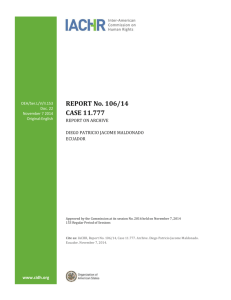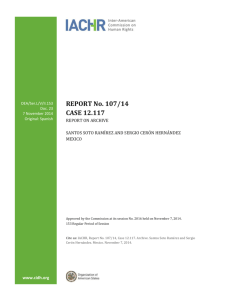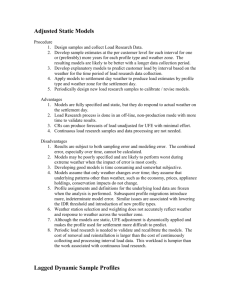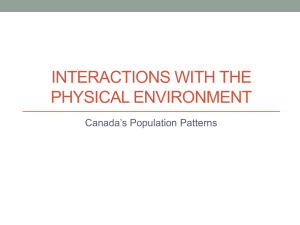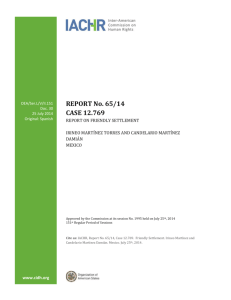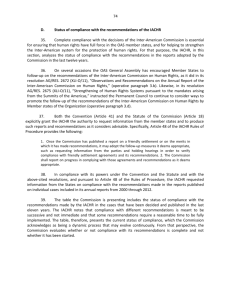REPORT No. 10/15 CASE 12.756 - Organization of American States
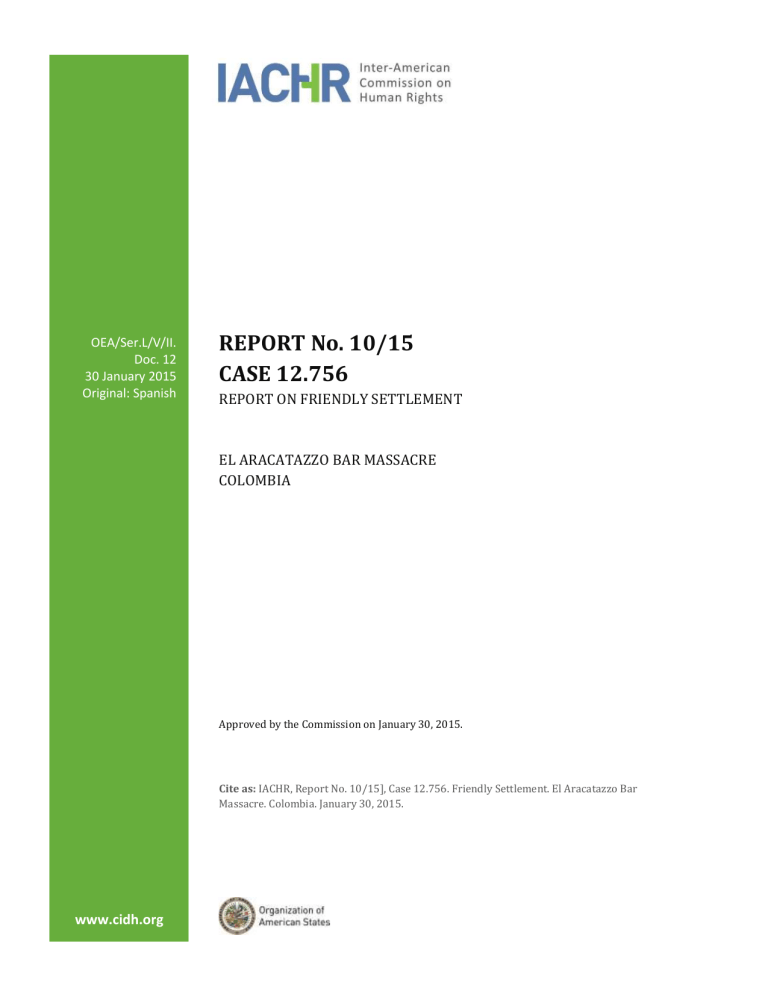
OEA/Ser.L/V/II.
Doc. 12
30 January 2015
Original: Spanish
REPORT No. 10/15
CASE 12.756
REPORT ON FRIENDLY SETTLEMENT
EL ARACATAZZO BAR MASSACRE
COLOMBIA
Approved by the Commission on January 30, 2015.
Cite as: IACHR, Report No. 10/15], Case 12.756. Friendly Settlement. El Aracatazzo Bar
Massacre. Colombia. January 30, 2015.
www.cidh.org
REPORT No. 10/14
CASE 12.756
FRIENDLY SETTLEMENT
EL ARACATAZZO BAR MASSACRE
COLOMBIA
JANUARY 30, 2015
I.
SUMMARY
1.
On November 21, 2005, the Inter-American Commission on Human Rights (hereinafter “the
Commission”) received a petition filed by José Luis Viveros Abisambra and María Stella Montoya Montoya, which alleged the Colombian State’s international responsibility for the death of 18 persons, including the following: Jorge Luis Julio Cárdenas, Luis Alberto Guisao Ríos, Mélida María Jiménez Borja, Leonardo Minota
Mosquera, Francisco Leonardo Panesso Castañeda, Willington de Jesús Tascón Duque, Héctor Alonso Tascón
Duque, Libia Úsuga Úsuga, and Jorge Iván Zúñiga Becerra, in a bar/discotheque called “El Aracatazzo” in the district of El Bosque, in the municipality of Chigorodó, department of Antioquia. The petition was filed for the benefit of the nine above-mentioned victims and their next of kin.
1 The petitioners alleged the violation of
Article 4 (right to life), Article 8 (right to a fair trial), and Article 25 (right to judicial protection) of the
American Convention on Human Rights (hereinafter the “Convention” or the “American Convention”) and
Article XVIII (right to a fair trial) of the American Declaration of the Rights and Duties of Man (hereinafter the
“American Declaration”).
2.
The petitioners pointed out that, on August 12, 1995, members of paramilitary groups killed
18 persons in the “El Aracatazzo” bar in the municipality of Chigorodó, department of Antioquia, with the acquiescence of public officers who were in the military installations of the Infantry Battalion No. 46 of the
National Army located 1,500 meters away from the scene of the crime. The petitioners alleged that the police officers had neglected to take protection measures when hearing the shots that were fired and to rescue the civilian population that was in the above-mentioned locale, despite their proximity to the bar and although they had heard the shots fired. Furthermore, the petitioners alleged the absence of any criminal investigation or disciplinary investigation of those involved, and that more than 10 years had elapsed without punishment of those allegedly responsible for the above-mentioned incidents.
3.
As for the State, it recognized its international responsibility for its omissions in the incidents that took place in the El Aracatazzo bar and submitted information indicating that 12 persons had been investigated, brought to trial, and convicted for these incidents in proceedings filed within the ordinary jurisdiction.
4.
The IACHR admitted the present petition through its Admissibility Report No. 47/10 of
March 18, 2010. In its report, the IACHR concluded that it had competence to examine the alleged violations of Articles 2, 4, 5, 8 and 25 of the American Convention on Human Rights in connection with Article 1 of the
1 The petitioners indicate there are 57 next of kin as alleged victims of the incidents: Ana Rita Amaya Zapata, Jorge Eliécer Julio
Gutiérrez, Luis Alfonso Julio Gutiérrez, Ana Paola Julio Amaya, Cástulo Julio Zurique, Federmán Julio Cárdenas, Edilsa Julio González, José
Aldemar Guisao David (o Davia), Rosana Ríos Arias, Gilma Rosa Guisao Ríos, Rosalba Guisao Ríos, María Mercedes Guisao Ríos, Rosangela
Guisao Ríos, Rosa María Guisao Ríos, Martha Luz Guisao Ríos, Félix Antonio Molina, Erika Yesenia Molina Jiménez, Sebastián Antonio
Molina Jiménez, Rosa Margarita Borja de Jiménez, Gloria Elena Jiménez Borja, Hernando Jiménez Borja, Carlos Enrique Jiménez Borja,
Edwuard Adulber Jiménez Borja, Elvia Cecilia Moreno Muñoz, Eliana Patricia Cortés Moreno, Yofaide Úsuga Moreno, Ángela María
Álvarez Correa, Francisco Leonardo Panesso Álvarez, Juan Guillermo Panesso Álvarez, Camilo Andrés Panesso Álvarez, Luis Alfredo
Panesso Hernández, Ana Morelia Castañeda Urrego, María Eugenia Castañeda, Bertha Alicia Palacios Castañeda, Jorge Enrique Cortés
Castañeda, Yudis Ester Cortés Castañeda, Ana Morelia Cortés Castañeda, Ana Joaquina Duque, Judith Amparo Duque, María Esther Duque,
Luz Stella Rincón Duque, Jorge Edinson Tascón Duque, Efrey Alberto Quintero Úsuga, Arleiber de Jesús Barrientos Úsuga, Jorge Andrés
Barrientos Úsuga, Adolfo Enrique Gómez Úsuga, Daniel José Gómez Úsuga, Ana Elisa Úsuga Holguín, Hernando Úsuga Úsuga, Carlos
Enrique Úsuga Úsuga, Rosmeri Úsuga Úsuga, Hildorfo Antonio Úsuga Úsuga, Nélida Marlyn Úsuga Úsuga, Omaira Úsuga Holguín, Elvia
María Becerra Mosquera, Diana Cecilia Zúñiga Becerra, and Bladimir Córdoba Becerra. Original petition received in the IACHR on
November 21, 2005.
1
same instrument. The IACHR also declared the inadmissibility of the alleged violation of Article XVIII of the
American Declaration.
5.
By means of a communication on July 27, 2010, the Colombian State accepted the offer of the
IACHR to facilitate a possible friendly settlement and expressed its willingness to initiate the said process with the purpose of reaching a friendly settlement that would determine the alternatives and scope of possible reparations for the victims in this case, so as to guarantee comprehensive reparations, identify mechanisms to promote the corresponding criminal investigations in the domestic legal system, and agree upon a concrete work timetable.
6.
The IACHR provided its good offices so that the parties could make progress in reaching a friendly settlement, which materialized on December 12, 2014, when the parties signed the said instrument to their satisfaction and requested its approval by the Commission.
7.
In the present report on friendly settlement, pursuant to the provisions of Article 49 of the
Convention and Article 40.5 of the Commission’s Rules of Procedure, a summary of the incidents alleged by the petitioners is provided, and the friendly settlement agreement signed on December 12, 2014 by the petitioners and the representatives of the Colombian State is transcribed herein. Likewise, the agreement entered into by the parties is adopted, and it is agreed that the present report shall be published in the Annual
Report of the IACHR to the General Assembly of the Organization of American States.
II.
PROCESSING WITH THE COMMISSION
8.
The petition was ruled admissible by the IACHR on March 18, 2010 on the basis of its
Admissibility Report No. 47/10, which was notified to the parties on April 26, 2010. Likewise, with the said notification, the Commission offered its food services to facilitate a possible friendly settlement.
9.
The Colombian State indicated its intention to reach a friendly settlement on the basis of the brief of July 27, 2010, which was forwarded to the petitioners who submitted their acceptance of using the friendly settlement mechanism on September 29, 2010. On November 9, 2010, the State reported to the
IACHR that various working meetings had been held, and this information was forwarded to the petitioners.
The parties reported jointly to the IACHR about the progress made in the friendly settlement process on July
26, 2010.
10.
The petitioners submitted information on July 11, August 31, and September 18, 2012, which was forwarded to the State. The State requested seven extensions on October 11 and November 26, 2012 and on January 23, March 8, May 2, July 3, and August 20, 2013, which were granted by the IACHR. The parties submitted additional information jointly on February 7, 2013.
11.
On December 31, 2014, the Colombian State informed the IACHR about the friendly settlement agreement reached on December 12, 2014, in which the parties, by mutual agreement, requested the IACHR to approve said instrument. This information was forwarded to the petitioners for their observations, and on January 21, 2015, they submitted a brief ratifying all items of the agreement and requesting its approval.
III.
ALLEGED FACTS
12.
The petitioners alleged that, on August 12, 1995, at 9:45 at night, about 15 members of paramilitary groups had killed 18 persons in the bar called “El Aracatazzo,” located in the district of El
Bosque, in the municipality of Chigorodó, department of Antioquia. As alleged in the petition, the paramilitary members had circulated freely on the road leading to the locale, with the acquiescence of the police, as various police officers were installed in a military post that the National Army had built on that same road
1,500 meters from the premises of “El Aracatazzo.” The petitioners alleged that, although the blasts of rifle shots had been heard in the area where the military post was located, the state officers had not gone to protect and rescue the civilians who were there.
2
13.
According to the allegations of the petitioners, the incidents were heard by the criminal military jurisdiction, which abstained from opening the investigation through a decision issued on November
9, 1996 by the Military Criminal Investigation Court No. 21. Afterwards, the Regional Direction of Prosecution
Offices of Medellín would have requested the Military Criminal Investigation Court No. 21 to investigate a sergeant and a captain of the Brigade XVII of the Army, which led to the reopening of the investigation.
Nevertheless, on March 19, 1999, the Military Criminal Investigation Court No. 21 decided, for a second time, to refrain from starting an investigation because the incidents had been perpetrated by paramilitary groups.
14.
The petitioners also alleged that the Office of the Attorney General of the Nation would have declared on October 23, 2002 the applicability of a statute of limitations for the disciplinary investigation of two members of the National Army on active duty, because of the expiration of the time-limits to conduct the investigation. Finally, regarding the investigation in the contentious-administrative jurisdiction, the petitioners contended that the next of kin of the alleged victims filed a complaint for direct reparations against the Ministry of Defense with the Administrative Court of Antioquia, which would have dismissed the allegations of the complaint by a judgment made on October 15, 2004. An appeal was filed against this judgment on November 25, 2005. The petitioners highlighted that, in the framework of said proceedings, a settlement had been carried out, which was approved by decision dated May 21, 2008 issued by the
Administrative Dispute Court of the State Council, in which various complainants would have been excluded and in which the redress for the moral damages that were allegedly caused would have not been included either.
15.
The State submitted information during the petition’s admissibility stage with respect to the progress that was achieved in the various jurisdictions where the case had been heard. In that respect, the
State’s version was consistent with the petitioners’ allegations in relation to the proceedings filed before the military jurisdiction and also regarding the disciplinary proceedings filed against the public officers, as well as the contentious-administrative process to provide redress for the victims. The State also alleged that the alleged paramilitaries involved in the incidents had been investigated and punished, with 12 persons convicted and sentenced to prison and to the payment of fines and forbidden to exercise public functions.
16.
The State added that investigations had been conducted against state agents allegedly involved in the incidents in the regular justice system by the Human Rights Unit of the Attorney General’s
Office for criminal conspiracy and “mistreatment of civilians” in the case filed as 270 UDH. Furthermore, it indicated that, on September 23, 2003, the dismissal of the investigation would have been decreed.
17.
Regarding the administrative dispute proceedings, the allegations of the State confirmed the information provided by the petitioners. In addition, the State indicated that the settlement order of May 21,
2008, issued by the Third Section of the State Council, specified the compensation for material and moral damages to be paid for the benefit of the next of kin of the victims Jorge Luis Julio Cárdenas, Luis Alberto
Guisao Ríos, Mélida María Jiménez Borja, Leonardo Minota Mosquera, Francisco Leonardo Panesso Castañeda,
Willinton de Jesús Tascón Duque, Héctor Alonso Tascón Duque, Libia Úsuga Úsuga, and Jorge Iván Zúñiga
Becerra.
18.
Regarding the civilians allegedly involved as perpetrators of the “El Aracatazzo” massacre, the State added that two proceedings would have been undertaken. The first process was filed as No. 18.522, for the crime of establishing armed groups of private justice operating outside the law, which started with decision to open up the investigation issued by the Regional Public Prosecutor of Carepa on August 16, 1995.
According to the State’s allegations, in these proceedings, 11 indicted suspects were convicted and sentenced to 6 years 8 months prison and a fine of 33 monthly minimum wages legally in force at the time (salarios
mínimos legales mensuales vigentes—SMLMV). Furthermore, the State pointed out that, between August 4,
1999 and June 19, 2007, parole was ordered for 10 of the convicted persons, and of these there were five who actually benefited from parole, four who served their full sentence, and one who benefited from the suspension of his sentence.
3
19.
On the basis of information provided by the State, the second criminal proceedings, filed as case No. 861.264, would have started on August 13, 1995, as a result of a resolution issued by the Regional
Delegate Prosecutor of Apartadó, for the incidents that took place in “El Aracatazzo.” According to the allegations, in these proceedings 6 persons would have been investigated, and on March 7, 1997, the partial termination of the investigation was ordered for four of them. Regarding one of the suspects, a plea bargain would have been issued with a 40-year prison sentence and an ancillary penalty of loss of public rights and ban from the exercise of public functions for 10 years, in addition to payment of material and moral damages, a ruling that would have been upheld in appeal on June 23, 1998. According to the Colombian State, subsequently the sentence would have been reduced again, recognizing time served for activities accredited in prison, and on June 19, 2007, he would have been granted parole.
20.
Likewise, as indicated by the State, on September 26, 1997, formal charges were brought against 5 other persons, and on April 26, 2000, a regional court would have convicted and sentenced them to
60 years prison for aggravated murder with terrorist purposes and to the ancillary penalty of loss of public rights and ban from the exercise of public functions for 10 years for the perpetration of 18 crimes of homicide and 1 attempted homicide. On November 19, 2000, the Criminal Clearing Chamber of the Superior Court of the Judicial District of Bogotá would have ruled on an appeal to overturn the judgment of the lower court for the benefit of one of the convicted suspects, dismissing the conviction for material and moral damages, but upholding the other considerations of the judgment being appealed.
21.
An appeal on constitutional grounds would have been filed for the defense of three of the convicted suspects, whereby the Supreme Court of Justice, on August 25, 2004, would have ordered to nullify all the proceedings from the closing of the investigation because of flaws in the technical defense of the accused, who were released on October 7, 2004. This trial had then been referred to the National Human
Rights and International Humanitarian Law Unit, UP Sub-Unit, as a result of Resolution No. 0-0173 of the
Office of the Attorney General of the Nation. One of those charged would have been convicted to 20 years of prison for the crime of multiple aggravated homicide, with an ancillary penalty of loss of public rights and ban from the exercise of public functions for 10 years, as well as the payment of material and moral damages, as a result of the judgment of December 16, 2008, issued by the Second Criminal Court of the Specialized Circuit of
Antioquia. According to what was indicated, on December 19, 2008, Specialized Attorney General’s Office UP
No. 91 ruled on the merits of the summary proceedings and indicted several of the suspects and dismissed the others. The State reported that some of those charged had benefited from Law 975 of 2005 (Justice and
Peace Law) and that the said investigations were still under way, but it did not report any final judgments of conviction at the time of the issuance of Admissibility Report No. 47/10 of the IACHR.
2
22.
Subsequent to the issuance of the Admissibility Report, the parties did not provide any additional information about the various proceedings being carried out in different jurisdictions as a result of the incidents that took place in the El Aracatazzo bar. On July 11, 2012, the petitioners reported in general that, although some of the proceedings against the paramilitaries were carried out in the ordinary jurisdiction and 12 persons were convicted for charges in connection with the incident punishable by law, there had been no convictions in the framework of the Justice and Peace Law. In that respect, they indicated that, although the involvement of various persons linked to the El Aracatazzo crime had been recognized, none of them had been convicted under this law. The petitioners even reported that one of the persons allegedly involved in the incidents would have been extradited to the United State on drug trafficking charges before concluding his statement on the incidents. The petitioners also highlighted the situation of impunity that of the state agents, because no judgment on the merits would have been adopted to establish their responsibility for the incidents that took place. In the same brief, the petitioners reported that, after a meeting held between the parties in November 2010, they submitted a joint proposal for settlement to the Government Attorney’s
Office (PGN), which reflected the agreement reached between the parties in connection with a group of victims that had been excluded from the settlement adopted in 2008.
2 See IACHR, Report on Admissibility No. 47/10 of March 18, 2010. Petition 1325-05. Estadero “El Aracatazzo” Massacre.
Colombia. Paragraphs 29-31.
4
IV.
FRIENDLY SETTLEMENT
23.
On December 12, 2014, the petitioners, represented by Luis Felipe Viveros Montoya, of the
Legal Center of Antioquia, signed a friendly settlement agreement with the Colombian State represented by
Luisa Alexandra Torres Acosta, Legal Defense Director of the National Legal Defense Agency of the State, on the basis of the following terms:
FRIENDLY SETTLEMENT AGREEMENT
FIRST: RECOGNITION OF RESPONSIBILITY
With respect to the incidents that occurred on August 12, 1995 in the bar called "El
Aracatazo" (sic), located in the district of El Bosque of the municipality of Chigorodó,
Antioquia, where a group operating outside the law killed Messrs. Jorge Luis Julio
Cárdenas, Luis Alberto Guisao Ríos, Mélida María Jiménez Borja, Leonardo Minota
Mosquera, Francisco Leonardo Panesso Castañeda, Willinton de Jesús Tascón Duque,
Héctor Alonso Tascón Duque, Libia Úsuga Úsuga, and Jorge Iván Zúñiga Becerra; the
Colombian State recognizes its international responsibility for having neglected its duty to guarantee the rights recognized in Article 4 (right to life) and Article 5 (right to humane treatment) of the American Convention on Human Rights, in connection with the general obligation set forth in Article 1.1 of the same instrument. The Colombian State also recognizes its international responsibility for the violation of the right to humane treatment (Article 5) with respect to the next of kin of the victims.
SECOND: JUSTICE
The parties recognize the progress made in administering justice in the present case.
Nevertheless, the State commits to continue fulfilling its obligation to investigate, bring to trial and punish those responsible for the incidents.
THIRD: MEASURES FOR SATISFACTION AND REHABILITATION
The State pledges to provide support for the victims in the present case, so that they can have access to the reparation plans, programs and projects being offered by the Colombian
State by means of the integral services, assistance and reparation model implemented by the Unit for Integral Assistance and Reparation for Victims.
FOURTH: GUARANTEES OF NON-REPETITION
The Colombian State pledges to continue implementing education programs on human rights and international humanitarian law in Colombia’s armed forces. It also pledges to include case 12.756 “El Aracatazo” (sic) bar massacre as a subject for study and analysis in extra-curricular training events focusing on human rights in the various training and education schools.
FIFTH: PECUNIARY REPARATION
The State pledges to enforce Law 288 of 1996 once the present friendly settlement agreement has been approved with issuance of the report pertaining to Article 49 of the
Inter-American Convention on Human Rights, for the purpose of redressing the following damages:
• The moral harm caused directly to the victims Jorge Luis Julio Cárdenas, Luis Alberto
Guisao Ríos, Mélida María Jiménez Borja, Leonardo Minota Mosquera, Francisco Leonardo
Panesso Castañeda, Willinton de Jesús Tascón Duque, Héctor Alonso Tascón Duque, Libia
5
Úsuga Úsuga, and Jorge Iván Zúñiga Becerra, for the incidents that took place in the “El
Aracatazzo” bar in the district of Bosque of the municipality of Chigorodó, Antioquia.
• The moral harm that could have been sustained by Jorge Eliecer Julio Gutierrez, Luis
Alfonso Julio Gutierrez, and Ana Paola Julio Amaya, as children of the victim Jorge Luis
Julio Cárdenas. Likewise, the moral harm that could have been sustained by Arleiber de
Jesús Barrientos Usuga, Jorge Andrés Barrientos Úsuga, Adolfo Enrique Gómez Usuga, and
Daniel Jose Gómez Usuga, children of the victim Libia Úsuga Úsuga.
SIXTH: APPROVAL AND FOLLOW-UP
The parties request the Inter-American Commission on Human Rights to approve the present agreement and to monitor its enforcement.
The parties also pledge, once the friendly settlement report has been issued (Article 49 of the Inter-American Convention on Human Rights), to periodically inform the Inter-
American Commission about its implementation, in accordance with the terms and conditions that the IACHR sets forth in the above-mentioned Report.
The present agreement was signed on December 12, 2014.
V. DETERMINATION OF COMPATIBILITY AND FULFILLMENT
24.
The IACHR reiterates that, pursuant to Articles 48.1.f and 49 of the American Convention, this procedure is aimed at “reaching a friendly settlement of the matter on the basis of respect for the human rights recognized in this Convention.” The acceptance of carrying out these proceedings expresses the State’s good faith to achieve the purposes and goals of the Convention on the basis of the principle of pacta sunt
servanda, whereby States must fulfill in good faith the obligations they have accepted in treaties.
3 It also wishes to reiterate that the friendly settlement process envisaged in the Convention makes it possible to settle individual cases in a non-adversarial manner and has proven, in cases from various countries, to be an important vehicle for settlement that can be used by both parties.
25.
The Inter-American Commission has closely followed the evolution of the friendly settlement reached in the present case and highly appreciates the efforts made by both parties during the negotiations on the agreement to reach a friendly settlement compatible with the Convention’s purposes and goals.
26.
The IACHR takes note of the information submitted jointly by the parties in a brief of
December 24, 2014, whereby the pecuniary reparations were calculated taking as a reference the request for out-of-court settlement that both the petitioners and Ministry of Defense filed together on August 9, 2011 with the Office of the Government Attorney of the Nation, which according to the parties materially constitutes the agreement between the parties on this specific matter. The Commission also appreciates and highlights positively the fact that the Colombian State has declared that the incidents that were the target of the investigation conducted by the Attorney General’s Office filed as No. 081 DINACE Aracatazzo Massacre were declared crimes against humanity.
27.
The IACHR also takes note of the brief by the petitioners on January 21, 2015, whereby they ratified each and every one of the items in the friendly settlement agreement and requested that an approval report in connection with Article 49 be issued, which they deem is necessary for the enforcement of the items in said document.
3 Vienna Convention on the Law of Treaties, U.N. Doc A/CONF.39/27 (1969), “Article 26: Pacta sunt servanda. Every treaty in force is binding upon the parties to it and must be performed by them in good faith.”
6
28.
In line with what was set forth in the friendly settlement agreement, the parties have jointly requested the Commission to adopt the report referred to in Article 49 of the American Convention, in order to start the proceedings to grant the victims the reparations measures stipulated in item five of the Friendly
Settlement Agreement with respect to the enforcement of Law 288 of 1996 by the State.
29.
The Inter-American Commission appreciates the Colombian State’s recognition of its international responsibility, as enshrined in the friendly settlement agreement, for its omission to guarantee the rights to life and humane treatment set forth in the American Convention on Human Rights with respect to nine of the victims who died during the incidents that took place in the El Aracatazzo massacre, as well as the violation of the right to humane treatment with respect to the next of kin of these victims.
30.
The IACHR also positively commends the joint recognition by the parties regarding the various progress made in administering justice in this case, especially the actions to investigate, bring to trial and convict 12 of the persons involved in the massacre that took place in the El Aracatazzo bar. It also urges the State to continue taking the actions that are needed to fulfill its obligation to investigate, bring to trial and punish other persons that might possibly be responsible for these incidents, specifically those persons who, during the proceedings carried out in the context of the Justice and Peace Law, have recognized their involvement in the massacre, as well as those civil servants who have been identified for their responsibility by either action or omission.
31.
Furthermore, the IACHR highlights the other reparation measures set forth in the friendly settlement agreement, especially the commitment accepted by the State to incorporate the incidents that occurred in El Aracatazzo as part of the materials to be studied in armed forces training programs. This shall not only contribute to improving the provision of the public security services, but also to ensure remembrance of and pay tribute to the victims who died. Finally, the IACHR urges the State to act with celerity to enforce the reparations measures provided for by the friendly settlement agreement signed by the parties.
32.
By virtue of the above, the IACHR considers that these commitments are in the process of being fulfilled, for this reason it will continue to oversee this process.
CONCLUSIONS VI.
33.
On the basis of the considerations above and by virtue of the procedures provided for in
Articles 48.1.f and 49 of the American Convention, the Commission wishes to reiterate its deep appreciation for the efforts made by the parties and its satisfaction for the achievement of a friendly settlement in the present case, based on the respect for humans rights and compatible with the American Conventions’ purposes and goals.
34.
By virtue of the considerations and conclusions indicated in the present report,
THE INTER-AMERICAN COMMISSION ON HUMAN RIGHTS
DECIDES:
1.
To approve the terms of the agreement signed by the parties on December 12, 2014.
2.
To continue overseeing the commitments whose fulfillment by the Colombian State is still pending. For this purpose, to remind the parties of their commitment to periodically inform the IACHR about its fulfillment.
3.
To publish the present report and include it in its Annual Report to the General Assembly of the OAS.
7
Done and signed in the city ofWashington, D.C., on the 30th day of the month of January of 2015.
(Signed): Tracy Robinson, President; Rose-Marie Antoine, First Vice-President; Felipe González, Second Vice-
President; José de Jesús Orozco Henríquez, Rosa María Ortiz, Paulo Vannuchi, y James L. Cavallaro,
Commissioners.
8
